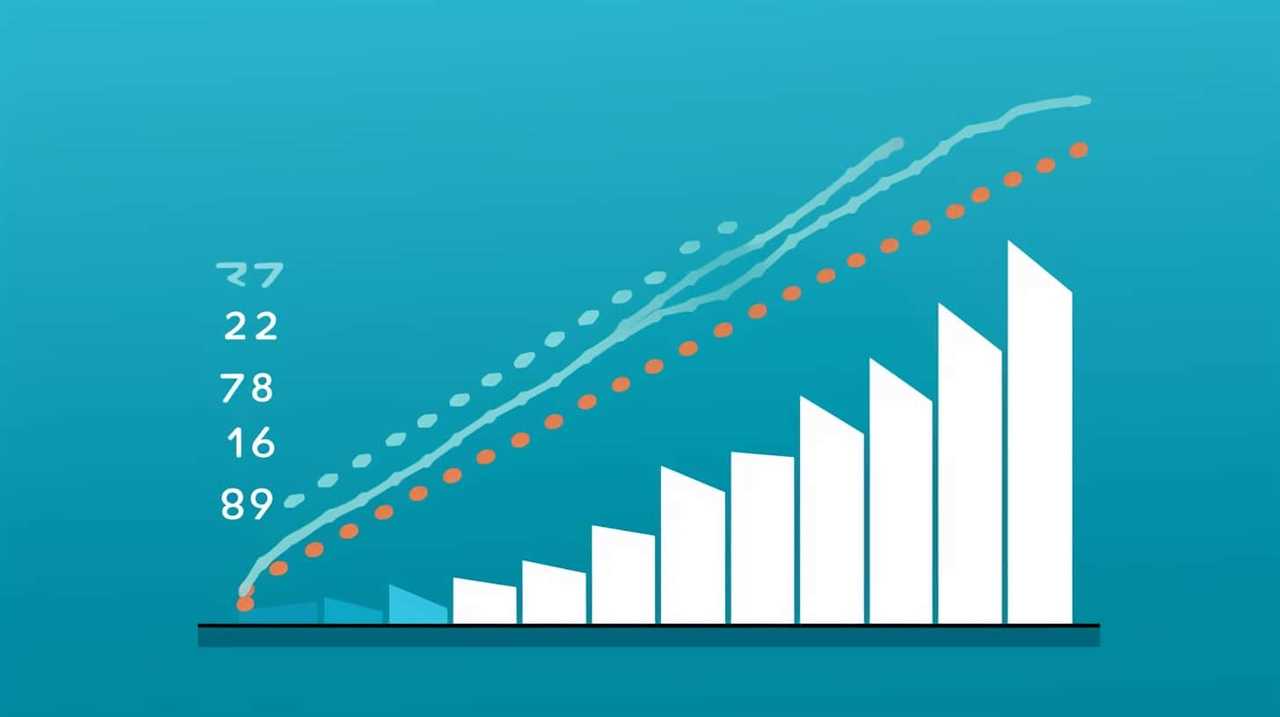Are you ready to take your SEO keyword research to the next level? Find out our top tactics for optimal outcomes right here!
In this article, we’ll dive into the importance of keyword analysis, understanding search intent, and identifying high-volume keywords.
We’ll also cover long-tail keyword research, competitor analysis, creating SEO-friendly URLs, writing high-quality content, and monitoring keyword rankings.
Get ready to master the art of SEO keyword analysis and skyrocket your website’s performance!

Key Takeaways
- Keyword analysis is crucial for improving website visibility and rankings in organic search results.
- Understanding search intent is essential for tailoring content to meet user needs and enhance the overall user experience.
- Thorough keyword research helps identify high-volume keywords that can drive organic traffic and increase visibility.
- Long-tail keywords target a niche audience and have less competition, allowing for better conversion rates and targeted traffic.
Importance of Keyword Analysis
One of the key factors in achieving peak performance in SEO is understanding the importance of keyword analysis.
Keyword analysis is the process of researching and identifying the most relevant and effective keywords for your website or online content. It plays a crucial role in developing effective SEO strategies.
By analyzing keywords, you can gain insights into the search behavior of your target audience and optimize your content accordingly. This helps improve the visibility of your website in organic search results and drives more targeted traffic.
Keyword analysis also enables you to understand the competition for specific keywords and identify opportunities to rank higher in search engine results pages (SERPs).

Understanding Search Intent
When it comes to optimizing our website for search engines, understanding the intent behind users’ searches is crucial. By identifying user needs and tailoring our content accordingly, we can provide the most relevant and valuable information to our target audience.
This not only improves our website’s visibility and rankings but also enhances the overall user experience.
Identifying User Needs
We understand the importance of identifying user needs and understanding search intent in SEO keyword analysis for peak performance. By analyzing user behavior and employing effective keyword analysis techniques, we can gain valuable insights into what users are searching for and tailor our content to meet their needs.
Here are three key points to consider when identifying user needs:

- Conduct thorough keyword research: Utilize keyword research tools to identify relevant keywords and phrases that align with user intent. This will help you understand the specific needs and preferences of your target audience.
- Analyze user search queries: Pay attention to the language and context used in user search queries. This will provide insights into the information they’re seeking and help you create content that matches their intent.
- Monitor user engagement metrics: Track metrics such as click-through rates, bounce rates, and time on page to gauge user satisfaction and adjust your content strategy accordingly. This will help you identify any gaps in meeting user needs and optimize your website for better performance.
Optimizing Content Accordingly
To optimize content accordingly and understand search intent, we employ a comprehensive approach that involves utilizing quantifier determiners to accurately target our audience’s needs.
One crucial aspect of optimizing website content is ensuring the appropriate keyword density. By strategically incorporating relevant keywords throughout our content, we can enhance its visibility and relevance to search engines. However, it’s important to strike a balance and avoid overstuffing the content with keywords, as this can negatively impact the user experience and search engine rankings.
We carefully analyze search queries to gain insights into the intent behind them, allowing us to create content that precisely addresses users’ needs. This includes understanding whether users are seeking informational, navigational, or transactional content, and tailoring our content accordingly.
Identifying High-Volume Keywords
When it comes to optimizing our website for search engines, one of the most important aspects is conducting thorough keyword research.

By identifying high-volume keywords, we can gain valuable insights into what our target audience is searching for and tailor our content to meet their needs.
This not only helps us increase our visibility in search engine results, but also drives more organic traffic to our site.
Keyword Research Strategies
One essential step in conducting effective SEO keyword analysis is identifying high-volume keywords using strategic research strategies. To ensure the success of your SEO efforts, consider the following keyword research strategies:
- Use keyword analysis techniques: Utilize tools like Google Keyword Planner, SEMrush, or Moz Keyword Explorer to identify popular keywords related to your industry or niche. These tools provide valuable insights into search volume, competition, and potential opportunities.
- Conduct competitor analysis: Analyze the keywords that your competitors are ranking for to gain insights into their SEO strategies. This can help you identify high-volume keywords that you may have overlooked.
- Leverage long-tail keywords: Long-tail keywords are longer and more specific phrases that often have lower search volume but higher conversion rates. Incorporating these keywords into your content can help you attract more targeted traffic.
By implementing these strategies, you can identify high-volume keywords that will drive more organic traffic to your website.

Now, let’s explore how to optimize your content for search engines.
Optimizing for Search Engines
How can we effectively optimize our content for search engines by identifying high-volume keywords?
Optimizing for search engines is crucial for improving visibility and driving organic traffic to our website. By conducting thorough keyword analysis, we can identify high-volume keywords that are relevant to our content and target audience. This process involves researching popular search terms and identifying those with a high search volume and low competition.
By incorporating these keywords into our content, we can improve our website’s ranking on search engine results pages (SERPs). To optimize effectively, we should also focus on on-page optimization techniques such as optimizing meta tags, headers, and content structure.

Additionally, implementing a solid internal linking strategy and optimizing website loading speed can further enhance our search engine optimization efforts.
Long-Tail Keyword Research
We frequently conduct long-tail keyword research to optimize our SEO strategy for peak performance. Long-tail keywords are longer and more specific phrases that target a niche audience and have less competition compared to broad keywords.
Here are three key points to consider when conducting long-tail keyword research:
- Understand long tail keyword strategy: Long-tail keywords allow us to target a specific audience and capture highly motivated visitors who are more likely to convert. By focusing on these specific keywords, we can tailor our content to meet their needs and increase our chances of ranking higher in search engine results.
- Analyze long tail keyword competition: While long-tail keywords have less overall competition, it’s still important to assess the competition for each specific long-tail keyword. By analyzing the competition, we can identify opportunities and choose keywords that have a good balance of search volume and competition.
- Use keyword research tools: Utilizing keyword research tools can help us discover relevant long-tail keywords and provide valuable data such as search volume, competition, and related keywords. By using these tools, we can make more informed decisions about which long-tail keywords to target.
Competitor Analysis and Keyword Gap
Continuing from our discussion on long-tail keyword research, let’s now delve into competitor analysis and the keyword gap.

When it comes to optimizing your website for search engines, understanding your competitors’ strategies is crucial. Competitor analysis tools can provide valuable insights into their keyword usage and rankings, allowing you to identify opportunities and areas for improvement.
One effective technique is keyword gap analysis, which involves comparing your keyword list with that of your competitors to uncover keywords they’re ranking for, but you’re not. By identifying these gaps, you can develop a targeted strategy to close the gap and gain a competitive advantage.
This technique helps you identify untapped keywords that can drive more organic traffic to your website. Utilizing competitor analysis tools and keyword gap analysis techniques will ultimately enhance your SEO performance and increase your chances of ranking higher in search engine results.
Utilizing Keyword Research Tools
Now let’s explore how we can effectively utilize keyword research tools to enhance our SEO performance and gain a competitive edge.

Keyword research techniques and effective keyword targeting are essential for optimizing our website’s visibility in search engine results. To achieve this, we can make use of the following tools:
- Google Keyword Planner: This tool helps us identify relevant keywords and provides insights into their search volume and competition level.
- SEMrush: With its comprehensive keyword database, SEMrush allows us to analyze our competitors’ keywords and discover new opportunities for optimization.
- Ahrefs: Ahrefs provides valuable data on keyword rankings, search volume, and backlinks, enabling us to identify high-performing keywords and optimize our content accordingly.
Optimizing On-Page SEO With Keywords
When it comes to optimizing on-page SEO with keywords, there are two key points to consider.
First, keyword placement is of utmost importance. Ensuring that your keywords are strategically placed throughout your content can greatly improve your search engine rankings.
Second, optimizing your meta tags, including the title tag and meta description, with relevant keywords can significantly impact your website’s visibility and click-through rates.

Keyword Placement Importance
To maximize the effectiveness of on-page SEO, optimizing keyword placement is of paramount importance. Proper keyword placement can significantly impact your website’s ranking on search engine results pages (SERPs) and improve overall visibility.
Here are three key considerations for optimizing keyword placement:
- Title Tag: Including your target keyword in the title tag not only helps search engines understand the topic of your page but also entices users to click on your link when it appears in search results.
- URL: Incorporating your keyword into the URL structure can further reinforce the relevance of your page to search engines and make it more user-friendly.
- Header Tags: Utilizing header tags (H1, H2, etc.) with keywords can provide a clear hierarchical structure to your content and improve both user experience and SEO.
Optimizing Meta Tags
Optimizing meta tags is essential for maximizing on-page SEO with keywords.
Meta tags, such as title tags and meta descriptions, play a crucial role in informing search engines and users about the content of a webpage.

By optimizing title tags, which are displayed as the clickable headline in search engine results, we can improve the visibility and relevance of our website. Including relevant keywords in the title tags helps search engines understand the context of our content and rank it accordingly.
Similarly, optimizing meta descriptions, the brief summaries displayed below the title tags, allows us to entice users to click through to our website.
By incorporating keywords in meta tags, we can improve our website’s overall SEO performance and attract more organic traffic.
Now let’s explore how to effectively incorporate keywords in meta tags.

Incorporating Keywords in Meta Tags
Incorporating keywords in meta tags is an essential aspect of our SEO keyword analysis for achieving peak performance. When it comes to optimizing meta tags, there are certain best practices to follow and common mistakes to avoid. Here are three key considerations:
- Relevance: Ensure that the keywords you choose for your meta tags accurately reflect the content of your webpage. This helps search engines understand the context and relevance of your page.
- Placement: Strategically place your keywords in the title tag, meta description, and meta keywords tag. The title tag should include the primary keyword, while the meta description should provide a concise summary of the page’s content.
- Variety: Use a mix of long-tail and short-tail keywords in your meta tags. Long-tail keywords are more specific and can help target niche audiences, while short-tail keywords are broader and can attract a larger audience.
By incorporating these best practices and avoiding common mistakes, you can optimize your meta tags effectively and improve your website’s visibility in search engine results.
Now, let’s move on to the next section about creating SEO-friendly URLs.
Creating SEO-Friendly URLs
Let’s dive into how we can structure our URLs to be SEO-friendly and maximize our website’s performance. Using descriptive URLs has numerous benefits for search engine optimization.

By including keywords and relevant information in the URL, search engines can better understand the content of the page, which can lead to higher rankings. Additionally, descriptive URLs make it easier for users to navigate and remember the web address.
When it comes to URL structure optimization, there are a few best practices to keep in mind.
Firstly, keep URLs short and simple, avoiding unnecessary characters and parameters. Use hyphens to separate words and avoid using underscores.
Secondly, include relevant keywords in the URL, but be careful not to overstuff it.

Lastly, ensure that the URL is easy to read and understand, both for search engines and users.
Writing High-Quality Content With Keywords
To write high-quality content with keywords, we prioritize incorporating relevant and strategic keywords naturally throughout our writing. This not only helps improve search engine optimization but also ensures that our content remains informative and engaging for our audience.
Here are three key tips for achieving this balance:
- Conduct thorough keyword research: Before starting to write, we perform comprehensive keyword research to identify the most relevant and high-performing keywords for our content.
- Optimize keyword density: While it’s important to include keywords in our content, we also need to ensure that we don’t overdo it. We aim for an optimal keyword density that strikes a balance between keyword optimization and readability.
- Focus on user intent: Instead of simply stuffing keywords into our content, we focus on understanding the intent behind user searches. By addressing their needs and providing valuable information, we create high-quality content that resonates with our audience.
Monitoring Keyword Rankings and Performance
After conducting thorough keyword research and optimizing keyword density, we now turn our attention to monitoring keyword rankings and performance.

Monitoring keyword rankings is crucial for evaluating the effectiveness of our SEO efforts and understanding how our website is performing in search engine results pages (SERPs). By regularly tracking our keyword rankings, we can identify which keywords are driving traffic to our site and which ones may need improvement.
Additionally, measuring keyword performance allows us to assess the impact of our optimization strategies and make data-driven decisions to refine our approach. Utilizing tools like Google Analytics and SEO platforms, we can track changes in keyword rankings and analyze trends over time.
This data provides valuable insights that can inform our future keyword strategies and help us achieve continuous improvement in our SEO efforts.
Now, let’s explore how to adjust our keyword strategy for even better results.

Adjusting Keyword Strategy for Continuous Improvement
To achieve continuous improvement in our SEO efforts, we focus on adjusting our keyword strategy. This involves analyzing data and making strategic changes to optimize our website for search engines.
Here are three key steps we take to adjust our keyword strategy:
- Regularly monitor keyword performance: We track the ranking and performance of our targeted keywords to identify any changes or trends. This helps us understand which keywords are driving traffic and conversions, and which ones need adjustment.
- Conduct keyword research: We continuously research and identify new keyword opportunities based on user search behavior and industry trends. This allows us to stay ahead of the competition and ensure our content is optimized for relevant and high-performing keywords.
- Refine and optimize content: We regularly review and update our website content to align it with our keyword strategy. This includes optimizing meta tags, headings, and body text to ensure our targeted keywords are well-integrated and effectively communicate our content to search engines.
Frequently Asked Questions
How Do Search Engines Determine the Relevance of Keywords in Search Results?
Search engines determine keyword relevance through a combination of artificial intelligence and user behavior. The role of AI is crucial in analyzing and understanding the context, while user behavior, such as click-through rates and dwell time, provides valuable insights for ranking keywords.
Are There Any Ethical Considerations When Conducting Competitor Analysis for Keyword Research?
When conducting competitor analysis for keyword research, it is important to consider ethical considerations and prioritize data privacy. Respecting these principles ensures integrity and fairness in our approach to optimizing search engine results.

What Are the Best Practices for Incorporating Keywords Into Image Alt Tags?
Incorporating keywords into image alt tags is crucial for better SEO. To choose the right keywords, consider relevancy, search volume, and competition. Optimize image alt tags by using descriptive and concise keyword phrases.
How Can I Optimize My Website for Voice Search Keywords?
To optimize our website for voice search keywords, we need to implement effective voice search strategies. This involves understanding user intent, using natural language, and optimizing content for conversational queries.
Is It Necessary to Adjust Keyword Strategy Regularly, or Can I Set It and Forget It Once I’ve Done the Initial Research?
Regularly updating our keyword strategy is crucial for maintaining peak performance. Long tail keywords have a significant impact on search rankings, and setting it and forgetting it after initial research would limit our success.
Conclusion
In conclusion, mastering keyword analysis is crucial for achieving peak performance in SEO. By understanding search intent and identifying high-volume and long-tail keywords, we can optimize our website’s visibility.

Conducting competitor analysis and continuously monitoring keyword rankings allows us to stay ahead in the ever-changing digital landscape. Writing high-quality content with strategically placed keywords and creating SEO-friendly URLs further enhances our online presence.
With a well-adjusted keyword strategy, we can continuously improve our website’s performance and reach new heights in search engine rankings. It’s like rocket fuel for our online success!









